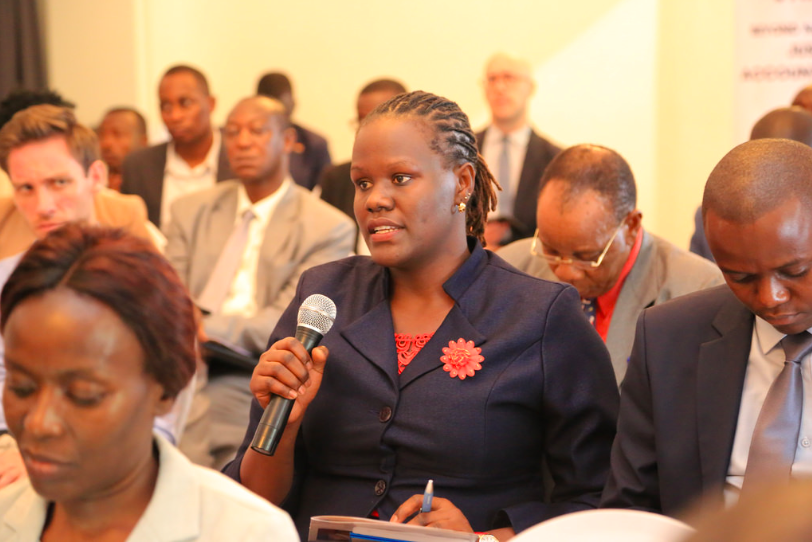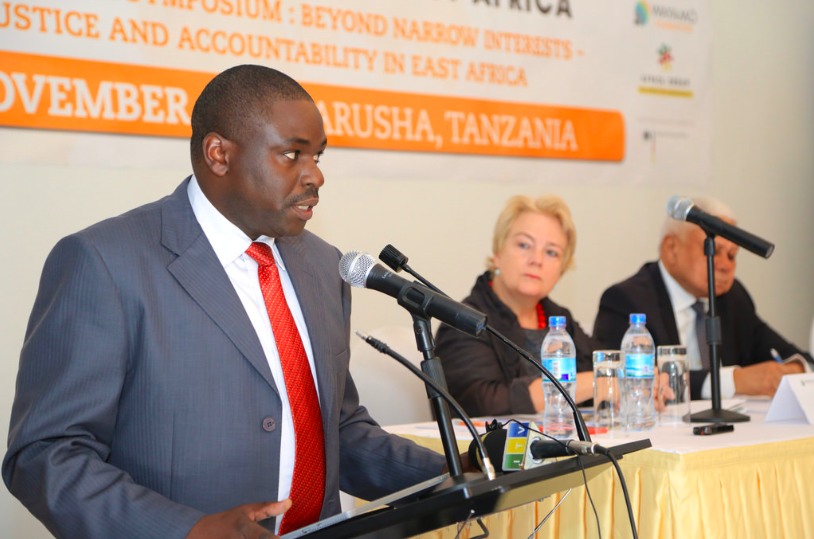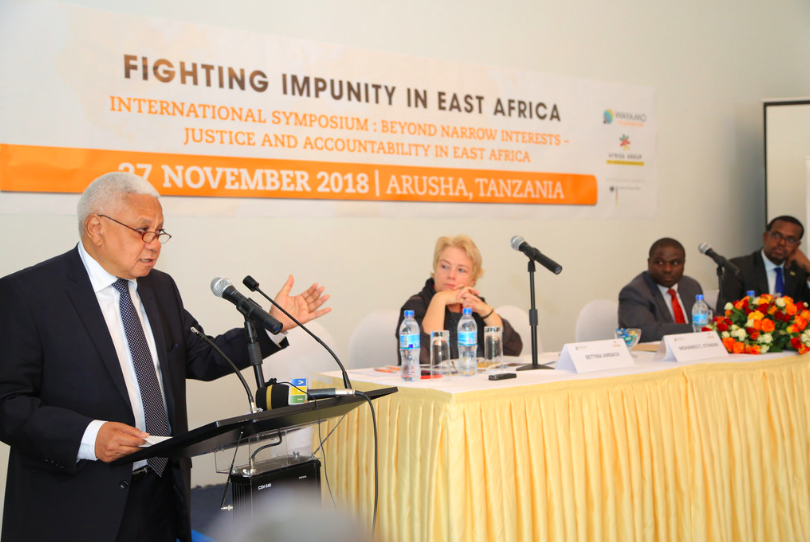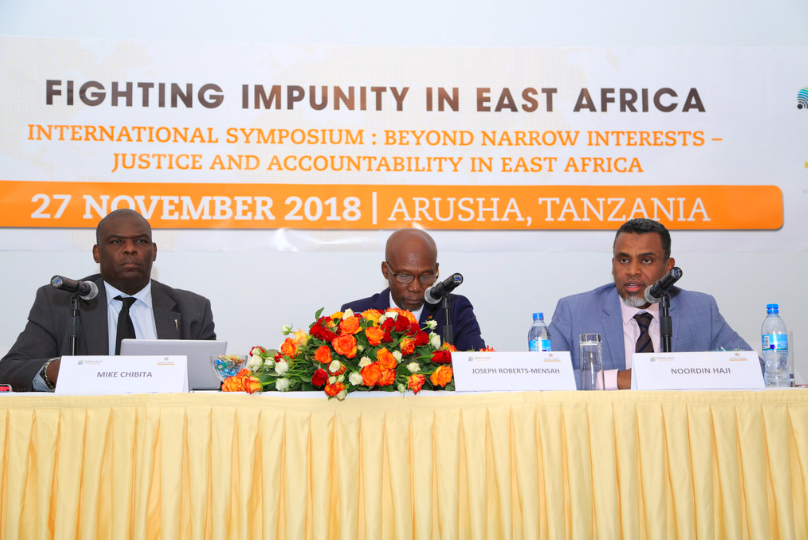Fighting impunity and ensuring accountability through fostering and facilitating networks, building capacity to enable domestic systems to address international and transnational crimes, holding international symposia, and engaging with the mass media.
To hold the sixth round of its “Fighting Impunity in East Africa” project, the Wayamo Foundation returned to where it had all begun…Arusha, Tanzania. Here, in the shadow of Mt. Meru, an intensive, week-long series of events was organised within the framework of an initiative funded by the German Foreign Ministry, co-hosted by the Africa Group for Justice and Accountability (AGJA), and fittingly entitled “BEYOND NARROW INTERESTS – JUSTICE AND ACCOUNTABILITY IN EAST AFRICA”.
As always, the programme adhered to the tried-and-tested “four-pillar format”, involving a network meeting, an international symposium, a training workshop and a media-engagement session.
Monday: Network Meeting
Click here for Network meeting pictures.
Given the Network’s designated aim of strengthening the rule of law across East Africa by ensuring effective cross-border investigation and prosecution of complex crimes and bolstering inter-agency collaboration, this fourth meeting assumed special importance. Not only did it afford an opportunity to consolidate and operationalise the Network, but it marked the first time that the Directors of Public Prosecutions (DPPs) of all four countries (Tanzania, Kenya, Rwanda and Uganda) coincided with the respective Directors of Criminal Investigation (DCIs) in what one participant described as “this unique grouping”.
In addition to the business in hand, the meeting heard two presentations by experts in their chosen fields: Philipp Ambach, Chief of the Victims Participation and Reparations Section at the International Criminal Court (ICC) spoke on the topical, often problematic subject of “The co-operation of States with the ICC”; and Matevz Pezdirc, European Network for investigation and prosecution of genocide, crimes against humanity and war crimes, Eurojust, addressed the highly pertinent subject of “Successes and challenges of network building and maintenance”.
The Meeting tackled the multifold challenges posed by co-operation among states having different legal systems and laws, with the kind of constructive attitude and approach that only experienced practitioners can bring to such matters. Indeed the DPPs present were able to profit doubly from the occasion, by using the following afternoon to hold an official meeting of the East African Association of Prosecutors (EAAP) at the very same venue, a pattern that might well be followed in future.
Tuesday: International Symposium
Click here for Symposium pictures.
The fact that parochial political interests and a narrow national focus continue to undermine the investigation and prosecution of complex, transnational and international crimes, raises the question of what can be done to overcome such myopic interests and insular approaches in order to further accountability for international and transnational organised crime. It was this that formed the core idea and theme running through the symposium, and the week as a whole.
The day’s proceedings were formally opened by a trio of dignitaries, made up of Tanzanian DPP, Biswalo Mganga, Rwandan Prosecutor-General, Jean-Bosco Mutangana,and Former Chief Justice of Tanzania and AGJA member, Mohamed Chande Othman.
This traditional start was followed by a free-flowing conversation between Wayamo moderator Joseph Roberts-Mensah and two special guests, the Ugandan and Kenyan DPPs, Mike Chibitaand Noordin Hajirespectively, who talked frankly and forthrightly -at times surprisingly so- about “The trials and tribulations of prosecuting in Uganda and Kenya”.
Other topics covered by the three panels during the morning and afternoon sessions were “Combating transnational organised crime and terrorism”, “Distributing justice: international, regional and domestic justice mechanisms” and “Judicial co-operation and the links between international criminal justice and transnational organised crime”. The panellists were drawn from Africa and around the world, and included: Nigerian prosecutor,Chika Nnanna; Kenyan Deputy DPP, Dorcas Oduor: Ugandans, Jane Okuo Kajuga, Senior Assistant DPP, and Nicholas Opiyo, human rights lawyer; former Ambassadors, Tuvako Manongiand Stephen Rapp; the President of the East African Court of Justice, Emmanuel Ugirashebuja; the ICC’s Philipp Ambachand William Rosato; Matevz Pezdircfrom Eurojust in The Hague; and roving United Nations Office on Drugs and Crime(UNODC) Regional Advisorfor Anti-Money Laundering and Counter-Terrorist Financing in Central Africa, Gary Hyde.
Wednesday, Thursday: Workshop
Click here for training pictures.
Renowned experts in the investigation and prosecution of international and transnational crimes led a two-day training workshop for investigators and prosecutors from Kenya, Uganda, Rwanda and Tanzania. Sessions covered numerous themes, including: a critical overview of core international crimes by Philipp Ambach; investigation techniques to combat international crimes by William Rosato; an assessment of combating illicit financial flows by Gary Hyde; a session by former Ambassador Stephen Rappon how to select appropriate charges and being creative in the process; the use of money laundering as the main or alternative offence in prosecutions by Constance V.W. Gikonyo; and finally, a “Train-the-Trainer” session by Joseph Roberts-Mensahand Bettina Ambach. The sessions were interactive and included numerous simulations in which all trainees participated. In addition, participants were asked to submit recommendations for future workshops. These will be used to shape future engagements by Wayamo in the region and beyond.
Wednesday: Media Engagement
Click here for media engagement pictures.
As an integral part of the programme surrounding the International Symposium, the organisers always facilitate a media engagement for senior journalists within the region, who work on issues pertaining to international criminal justice and accountability. This time, journalists from Rwanda, Uganda, Tanzania and Kenya were joined by a colleague from South Africa who had previously covered Wayamo events in that country.
Guest speakers invited to share their in-depth knowledge on various issues were: Stephen Rapp, former US Ambassador-at-Large for War Crimes Issues, who reviewed “20 years of the Rome Statute, 16 years of the ICC- is international criminal justice living up to expectations”, and whether America’s position had a negative position on the credibility of the ICC; Wayamo’s in-house international lawyer, Angela Mudukuti, who spoke on “African states and International Criminal Justice; Observations: Is nationalism preventing African countries from properly addressing international criminal justice and accountability?”; UNODC Regional Advisor, Gary Hyde, who provided a “Greater understanding of the impact of transnational/organised crime; linkages and new trends”; and finally, Wayamo Deputy Director, Mark Kersten, who discussed “Observations: Writing the justice story; what is lacking missing or non-existent in our journalism?”
The event took place over the course of a day, and participants were not only able to ask several questions of the speakers, but were actively encouraged to further interrogate the issues in a press-conference-style environment. Wayamo media engagements are specifically designed to broaden journalists’ knowledge base and foster cross-fertilisation of ideas, while at the same time building up and consolidating an East African network to share and support stories, resources and practice.





